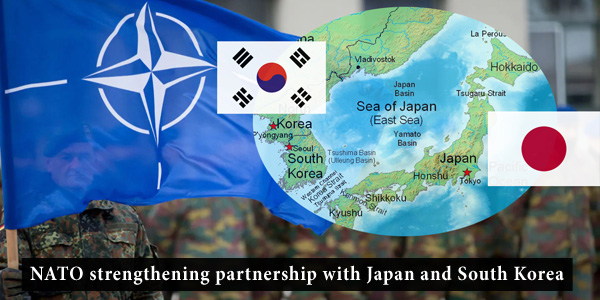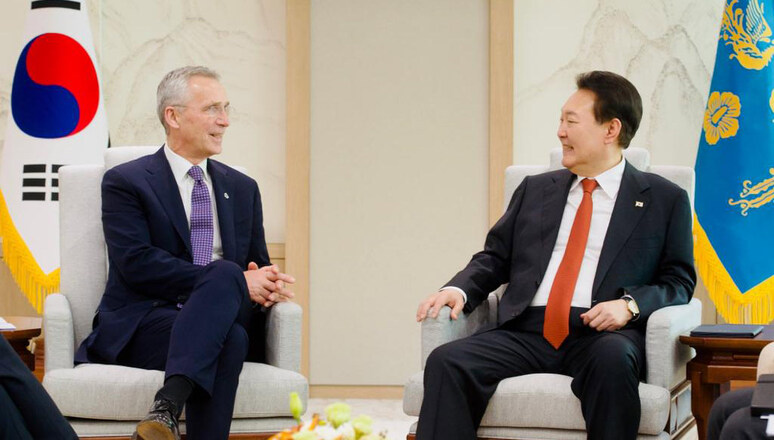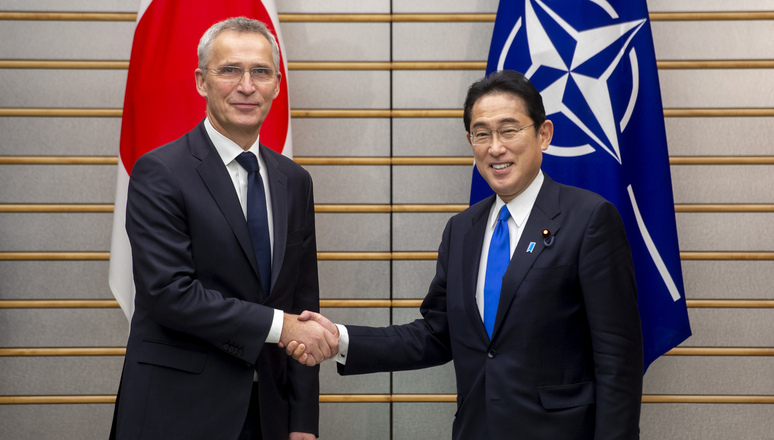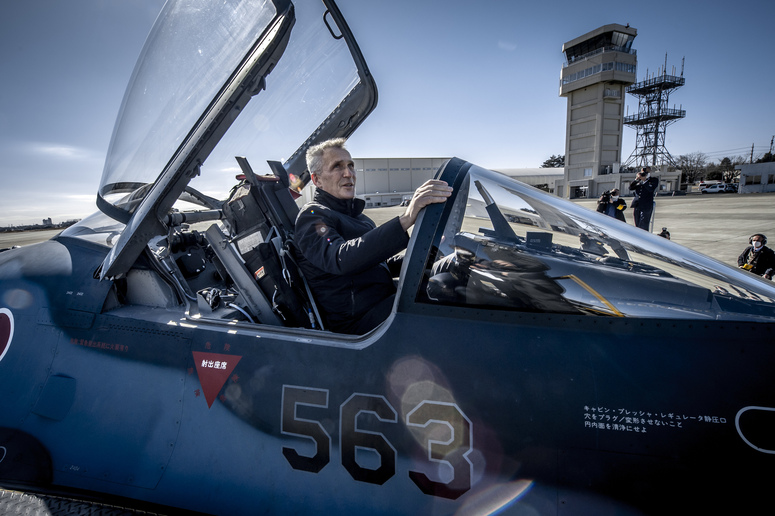NATO to strengthen partnership with Japan and South Korea

Traditionally, North Atlantic Treaty Organization (NATO) has acted as an alliance that focused on issues only related to transatlantic security. Since the majority of NATO member states are from Europe and due to their far-off proximity to the Indo-Pacific region, they do not see China or its rise as a threat to their regional security. However, the paradigm has shifted and China’s increasing influence has infiltrated, directly or indirectly, the interests of many NATO member states. In order to address the increasing threat posed by China, the scope of NATO has been expanded to include a framework that also addresses threats from other regions, especially focusing on the Indo-Pacific region.
Today, NATO is determined to strengthen cooperation with new and existing partners in the Indo-Pacific mainly to tackle cross-regional challenges and shared security interests, as well as to deter growing threats from China and North Korea.
According to the NATO 2022 Strategic Concept, The Alliance considers the Indo-Pacific as an important region, given that developments in that region can directly affect Euro-Atlantic security.
NATO Allies are working to bolster the defense-related infrastructure and supply chain mechanism to reduce its dependency on China. The alliance is exploring the possibility of generating an outreach to the Indo-Pacific region by establishing a communication medium that would provide a channel to maintain dialogue with China and keep an eye on its activities in the region.
“NATO is determined to safeguard the freedom and security of Allies. Its key purpose and greatest responsibility is to ensure our collective defense, against all threats, from all directions.” – NATO 2022 Strategic Concept
NATO’s new Strategic Concept focuses on strengthening partnerships with the allies and partners in the Indo-Pacific region especially, Japan, South Korea, and Australia. NATO 2022 Strategic Concept also highlights that the Alliance aims to boost shared awareness, enhance resilience and preparedness, and protect its allies against regional threats. The document underlines that the Allies are committed to “stand up for our shared values and the rules-based international order, including freedom of navigation.”
In light of NATO’s strategic aims, the Alliance’s Secretary General Jens Stoltenberg visited South Korea and Japan on his official visit to the region from January 29 to February 1, 2023.
 NATO Secretary General Jens Stoltenberg with President of the Republic of Korea Yoon Suk Yeol in Seoul, on January 30, 2023. (Image Credit: NATO)
NATO Secretary General Jens Stoltenberg with President of the Republic of Korea Yoon Suk Yeol in Seoul, on January 30, 2023. (Image Credit: NATO)
During his visit to South Korea, Stoltenberg met with the Republic of Korea (ROK) President Yoon Suk Yeol to discuss “common security challenges” and ways to strengthen the Alliance’s partnership with the ROK.
Stoltenberg and Yoon discussed key issues including the Russia-Ukraine war, the North Korea threat, and preserving international rules-based order. Both leaders also agreed to deepen cooperation between NATO and the Republic of Korea in areas including cyber defense, technology and arms control, and non-proliferation.
NATO Secretary General Stoltenberg and South Korean President Yoon agreed that they need to continue the pressure on North Korea to abandon its reckless missile and nuclear activities. Both leaders noted that transatlantic and Indo-Pacific security are deeply interconnected, and like-minded democracies need to stand together to protect the international rules-based order.
Stoltenberg also discussed the ongoing Russian aggression in Ukraine and highlighted the importance of supporting the Ukrainian people and its armed forces. According to the NATO statement, the secretary general commended the ROK’s “principled stance on Russia’s war of aggression against Ukraine, as well as its contributions to NATO’s humanitarian support for Ukraine.”
Stoltenberg said, “What happens in Europe matters to the Indo-Pacific, and what happens in Asia matters to NATO.” He noted that NATO and the Republic of Korea share common values and concerns and underlined that the Alliance is committed to working with the Republic of Korea and other like-minded partners to promote peace and preserve the international rules-based order.
The NATO secretary general also held a meeting with the ROK Foreign Minister Park Jin on January 29, 2023, and welcomed South Korea’s new Mission to NATO, which “demonstrates the increased importance of the partnership between NATO and the Republic of Korea”, the NATO statement highlighted. Both leaders also discussed the ongoing Russia-Ukraine war and shared concerns over threats emerging from North Korea. Stoltenberg rebuked North Korea’s nuclear program and its ballistic missile tests and said “We also know that North Korea is providing military support to the Russian war efforts with rockets and missiles, and this just highlights how we are interconnected.”
 NATO Secretary General Jens Stoltenberg with Prime Minister of Japan Fumio Kishida, on January 31, 2023. (Image Credit: NATO)
NATO Secretary General Jens Stoltenberg with Prime Minister of Japan Fumio Kishida, on January 31, 2023. (Image Credit: NATO)
While in Tokyo NATO Secretary General Stoltenberg met with Japanese Prime Minister Fumio Kishida and discussed shared security challenges and NATO’s deepening partnership with Japan. The secretary general also met with senior Japanese officials, including Foreign Minister Yoshimasa Hayashi, and personnel of Japan’s Self-Defense Forces.
During their meeting, Stoltenberg and Kishida agreed that the transatlantic and Indo-Pacific security are deeply interconnected, and set out a shared ambition to strengthen NATO-Japan cooperation. Stoltenberg acknowledged that “No NATO partner is closer or more capable than Japan.”
NATO secretary general and Japanese prime minister discussed growing challenges, ranging from China’s behavior in the region to military provocations by North Korea.
Japanese and NATO leaders also discussed the Russia-Ukraine war and agreed that the ongoing war is “not just a European crisis, but a challenge to the international order”. While discussing the issue, Stoltenberg warned, “Beijing is watching closely, and learning lessons that may influence its future decisions.” In this regard, Stoltenberg stressed on the importance of remaining united and firm to protect freedom and democracy from authoritarian regimes’ pushback against the international rules-based order.
During his meeting with the Japanese leader, Stoltenberg also welcomed Japan’s strict sanctions against Russia and its humanitarian support to the Ukrainian people. The NATO secretary general also welcomed Japan’s new capabilities and increased defense spending and the release of its new National Security Strategy and National Defense Strategy.
 NATO Secretary General Jens Stoltenberg tours Iruma Air Base. Secretary General Stoltenberg in the cockpit of an F-2 fighter jet. (Image Credit: NATO)
NATO Secretary General Jens Stoltenberg tours Iruma Air Base. Secretary General Stoltenberg in the cockpit of an F-2 fighter jet. (Image Credit: NATO)
NATO Secretary General Stoltenberg also visited Iruma Air Base in Japan and expressed satisfaction over Japan’s defense capabilities. While in Iruma Air Base, Stoltenberg thanked the forces for their contributions and support to Ukraine, as cargo planes based at Iruma have been transporting vital aid to Ukraine.
Stoltenberg also gave a speech at Keio University in Tokyo, Japan, on February 1, 2023, and said that “Among NATO’s partners, none is closer or more capable than Japan.” Stoltenberg stressed that “We share the same values, interests and concerns,” including supporting Ukraine and addressing the security challenges posed by authoritarian regimes. The NATO Secretary General also welcomed that the long-lasting friendship between NATO and Japan is growing stronger by the day.
Regions
Issues

























